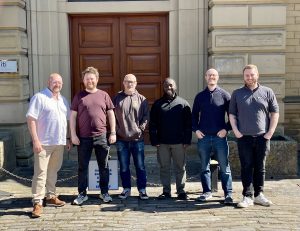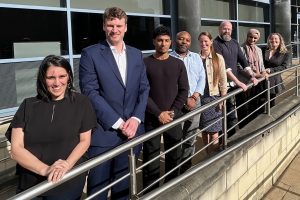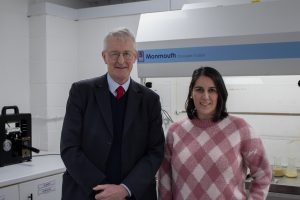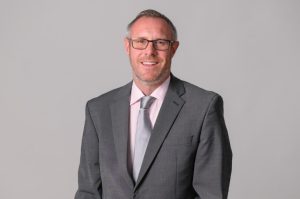Driving growth through backing the innovators and entrepreneurs
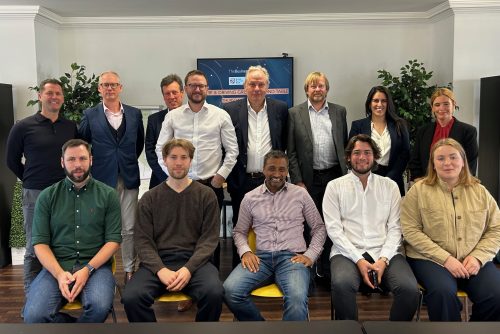
Creating the right conditions for entrepreneurs and innovative companies to thrive is hugely important to growth in the regions.
At the heart of this is funding, to make sure that businesses are able to develop and grow at the right pace.

The second Northern Powerhouse Fund, which launched earlier this year, has £660m to deploy with the aim of driving sustainable economic growth by supporting innovation and creating local opportunity, and by increasing the supply and diversity of funding available to smaller companies, from start-ups to scale-ups.

Simon Cunnington, British Business Bank
“Success will be that we found really good businesses across the whole patch, that they’ve gone on to grow, to innovate, and that we found a good spread of founders,” said Simon Cunnington, director at the British Business Bank.
“Ultimate success would be that there wasn’t an NPIF III, because we’d demonstrated you can actually invest funds in regions outside London, make it successful, find really great businesses that grow and create jobs, create new products and open new markets. That we showed to the private sector that it can be done.
“I don’t think we’re there with NPIF II yet. NPIF II is more flexible than NPIF I and we expect that there will be follow-on funds that will push it even further.”
Lizzy Upton, senior investment manager at the British Business Bank, added: “We want to crowd in private sector investments to the investments we’ve got.
“In terms of what success looks like for the first NPIF, the whole Fund supported about £1bn of investment. NPIF II is larger, so we’re expecting that crowd-in to be larger as a percentage of the fund, and so hopefully will be more than £1bn.”
The Fund offers a range of commercial finance options with smaller loans and debt finance from £25,000 to £2m and equity investment up to £5m for businesses in the North of England.
Pete Sorsby, who is fund principal for Mercia Debt Finance, said: “For a debt fund, we tend to be lending more to established businesses. You normally wouldn’t take debt as a business until you knew you’d got revenue and profit and cash to service that, because that’s what debt is, rather than more patient capital that will get you through those early years of formation and establishing.
“There are a lot of funders that will work at a certain level. This is aiming to get into that earlier stage and that smaller cheque size, to get businesses through the first phase.”
There are other factors that are also important to start-ups and pre-revenue businesses and their chances of becoming sustainable and successful.
Chris Lunardi, ecosystem manager at Barclays Eagle Labs in York, said: “Our strategy is working with the founders, rather than the business directly.
“We support the founders to help them to upskill themselves whether that’s funding readiness or through mentors to try and get some of that information out of people that have been there.
“I think there is a challenge that we haven’t solved yet across Yorkshire about how do you connect with those communities and actually get that information out? I think that leads into the question of ‘how do you get out to other people and more diverse communities?’”

Amir Hussain
Amir Hussain, founder of Bradford-based Yeme Tech, believes that a key difference is the exposure to opportunity and innovation.
“I come across so many people in Bradford that are really ambitious, really keen to do things, have got the means, have got the capacity, have got family support. But what they generally tend to do is open businesses that they could have opened 10-15 years ago,” he said.
“There’s nothing wrong with those businesses, but they’re not taking advantage of the opportunities that are available.
“So part of the answer is from asking ‘how do we connect through the ecosystems that they are connected to?’ For example, through their accountants. There is something about just understanding the supply chains within these areas.”
Liz Cashon, estates manager at York Biotech Campus, said her focus is also on the wider ecosystem, and not just on the businesses that are already based on the park.
“Obviously, it is very important to us to continue to nurture the growth of our businesses,” she said.
“But I think what our job really is to do is to bring the experienced businesses to those early stage businesses. Luckily, we’ve got some really, really good mentors on the site that are very, very prepared to talk to those businesses and explain exactly how they were successful in achieving the funding. Bringing that community together is essential, but it’s also essential to reach out to the wider community.”
The role of experienced people is at the forefront of Will Clark’s mind too. The Mercia managing director has advised companies for two decades, and it is one factor that is consistent through economic cycles and external events.
“The biggest challenge we face is working with the founder to build out the team,” he said. “When you are being very careful with the pounds and shillings, you have to do everything. Judging when is the right time to bring in and supplement with some senior hires is a real challenge.
“When it works, it’s beautiful to watch, but when it doesn’t, it’s a mess.”
For some of the entrepreneurs, securing funding is the outcome of overcoming a particular obstacle – to persuade someone of the opportunity and need, especially when it is in a specialist, technical area.

Victoria Garcia, chief executive of BindEthics
BindEthics chief executive Victoria Garcia is currently seeking funding for her business which has developed a bio-adhesive to replace formaldehyde-based solutions for the construction industry, that doesn’t use toxins and will enable recycling.
“Our biggest challenge is making people understand that we are at a time that we need to replace all the technology that comes from fossil fuels – from plastics to glue, virtually anything,” she said.
“It is somehow hard to make people understand that the only way we’re going to manage to get to net zero is by investing in innovation. I know it sounds obvious, but it’s a challenge.”
Armando Leal is the co-founder and chief executive of Eutechtics, an early-stage start-up in Sheffield that contributes to the efforts stopping climate change by developing modern and sustainable chemical technologies that decarbonise key elements of the chemical industry.
He said: “We are introducing new materials that are sustainable to be more competitive with current technologies that use fossil fuels, for example.
“In order to take this hard tech into a productive environment, we need a lot of collaboration. Collaboration sometimes can be really aggressive, and IP is a challenge.
“Scaling up is difficult, because once you achieve one stage, you need to go to the next one. Of course, you need to have that cluster of different businesses to try to develop technology and alternatives can take a long time.”
Jason Crispin, chief executive at IMAGINaiTION, a start-up that is developing an AI platform which automates accessibility testing on mobile applications.
He said: “We are pre-revenue, we’ve secured grant funding, and we’ve built our proof of concept, now we are actively raising a pre-seed round.
“That is our biggest challenge, specifically trying to convince investors that it’s worth the punt when we are pre revenue. We’ve got a bit of traction – 800 companies have signed up for the wait list – but being without revenue is a common reason to reject.”
James Fenwick runs Trad Collective, a sustainable clothing store in Leeds which has been open for three years.
He said: “We started off initially with private funding, and our biggest challenge has been our initial private funding was very small, so everything’s been very tight on a budget.
“We are looking for opportunities for growth in the future, but so far we’ve just been focusing on getting started.”

